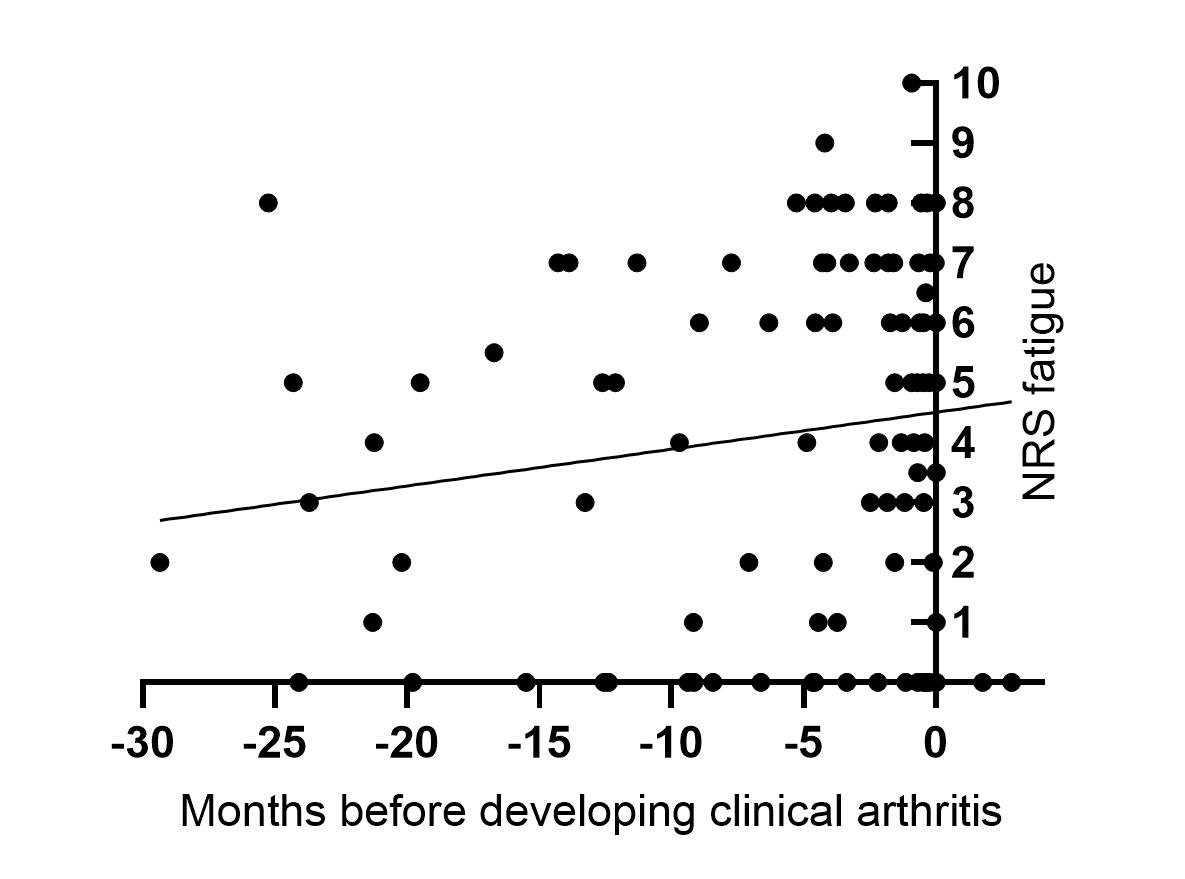Session Information
Date: Saturday, November 6, 2021
Title: Patient Outcomes, Preferences, & Attitudes Poster I: Impact (0225–0240)
Session Type: Poster Session A
Session Time: 8:30AM-10:30AM
Background/Purpose: Fatigue is disabling and common in Rheumatoid Arthritis (RA); the causation of fatigue in RA is multidimensional and only partially explained by inflammation. The question arises how fatigue develops in the preclinical phases of RA, and how inflammation is related to fatigue in the pre-arthritis phase. We hypothesized that inflammation explains fatigue to a greater extent at the beginning of developing RA, when processes are not yet chronified. Our aims are therefore (1) to describe the course of fatigue in patients with clinically suspect arthralgia (CSA) towards progression to RA, and (2) to assess the correlation between fatigue and inflammation in CSA patients and compare this to RA at the time of diagnosis.
Methods: 595 CSA patients were included between April 2012 and May 2020 in the Leiden CSA cohort and were followed for the development of RA. Additionally, baseline data of 710 consecutive early RA patients who were included in the Leiden Early Arthritis Cohort between August 2010 and March 2020, were studied. Inflammation was defined by MRI detected inflammation on contrast-enhanced 1.5T-MRI of hand and forefoot (scored according to the RAMRIS-method) and by C reactive protein (CRP) levels, representing local and systemic inflammation, respectively. Fatigue severity was measured on a numerical rating scale (NRS) from 0 (no fatigue) to 10 (extreme fatigue). A linear mixed model was used to analyze whether fatigue increased over time towards the development of RA. Correlations between fatigue and inflammation were studied using Spearman’s rank correlation coefficient.
Results: At first presentation, baseline fatigue (mean (SD)) was 4.5 (3) for patients who developed RA. Over time, fatigue severity increased gradually towards 4.7 ± 3.0 at the time of RA development; (β= -0.08 per month away from arthritis development, p=0.07, Figure 1). Assessing the correlation of fatigue with inflammation at CSA onset in patients who later on developed RA, revealed weak correlations with MRI-detected inflammation (ρ=-0.147, p=0.25) and with CRP-levels (ρ=0.165, p=0.17). For comparison at RA diagnosis, correlations between fatigue severity and inflammation were ρ=-0.074, p=0.09 for MRI-detected inflammation and ρ=0.023, p=0.34 for CRP-levels. Hence, although the correlation coefficients were slightly higher at CSA onset than at RA development, the correlations of fatigue with inflammation were weak at both disease phases.
Conclusion: Fatigue increased gradually during progression from arthralgia to RA. The correlation between fatigue with inflammatory measures in pre-RA patients were slightly higher than in early RA patients, but were still weak. This suggests that fatigue symptoms are largely disentangled from inflammation, even in the pre-arthritis phase of RA.
To cite this abstract in AMA style:
Khidir S, van der Helm-van Mil A, van Mulligen E. Fatigue and Inflammation in Rheumatoid Arthritis Are Already Disconnected Before Clinical Arthritis Develops [abstract]. Arthritis Rheumatol. 2021; 73 (suppl 9). https://acrabstracts.org/abstract/fatigue-and-inflammation-in-rheumatoid-arthritis-are-already-disconnected-before-clinical-arthritis-develops/. Accessed .« Back to ACR Convergence 2021
ACR Meeting Abstracts - https://acrabstracts.org/abstract/fatigue-and-inflammation-in-rheumatoid-arthritis-are-already-disconnected-before-clinical-arthritis-develops/

